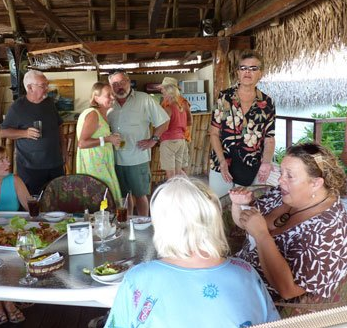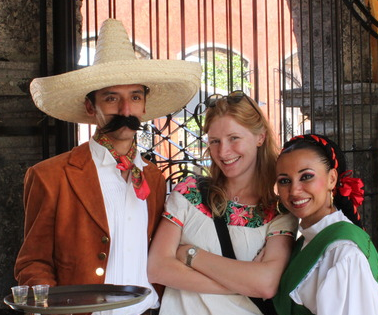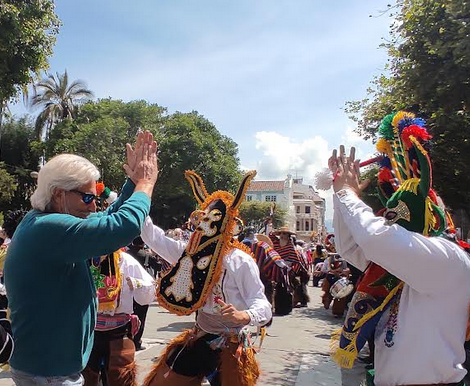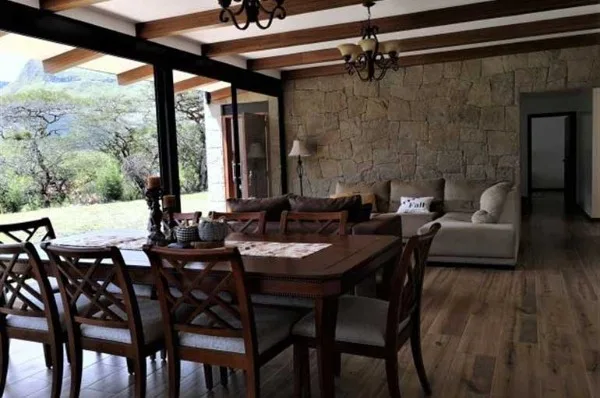Despite the glowing reviews about living abroad, the expat life is not for everyone
Editor’s note: Originally from California, Rick Ingle describes himself as a “student of expatriation.” Rick has lived overseas since 1984 in the Philippines, Singapore, Spain, Panama, and now Ecuador. He has lived in Cuenca since 2011. He’s currently interviewing English-speaking expats in seven countries about their overseas experiences, which he plans to include in a book.
By Richard Ingle
Being an expat is hard.

Expats in Costa Rica party hardy.
Somehow, that fact is lost in the media hype that seems to suggest that living in a foreign country is easy, cheap, and romantic. As someone who has spent almost half of his life overseas — and happily so, for the most part — I can tell you that the hype paints an unrealistic and incomplete picture.
According to a 1999 survey by the London School of Economics, the average time an expat spends overseas is about three years before going home. Although some move to another expat location, they will spend less time there than in the first. The survey focused on British, Canadian, and Australian expats but, from my 30 years of living abroad, it squares with what I’ve seen personally. Also from my experience, I believe the average time frame as an expat seems to be shorter in Southeast Asia — at least among English-speakers — but slightly longer in Mexico and Panama.
My research and experience also lead me to believe that the three-year expat time-frame is about right for Cuenca and Ecuador.
Why expats go home
In exploring the reasons why expats return to their home countries, I’ve found that many of those leaving have a “cover story” for their departure and often aren’t completely forthright about the underlying reasons. They disguise the real reasons so they don’t appear to be “failures” to other expats, as well as to friends and family members, many of whom will say, “I told you so.”

Many of the U.S. expats moving to refuse to learn Spanish, locals say.
The cover stories are usually similar: “Mom is sick back in Texas and needs us; there’s an employment opportunity that simply can’t be passed up; our daughter is going through difficult times after a divorce and needs our support; we didn’t realize how much we’d miss the grand kids; I need surgery and am more comfortable having it done in the States.”
Of course, some of these are perfectly legitimate reasons for going home; sometimes, family problems simply cannot be ignored. In most cases, however, when I pressed those who were leaving, I found other factors led to the decision to leave.
The overwhelming reason for leaving is discomfort with the language in particular and the culture in general. This is a broad category, of course, that covers an inability to communicate with locals, an inability to understand customs and traditions. Ultimately for many expats, this leads to homesickness for life in the home country.
Here are some representative comments from my interviews with expats leaving Ecuador. Most of those departing asked to remain anonymous, so I use only an initial and their city as identification.

Some expats join in the fun during local festivals.
I miss the things I grew up with and have never really felt at home in Ecuador. I miss the way we celebrated Christmas in the U.S. I miss Thanksgiving. I miss my favorite foods. And I’m embarrassed to say it, but I miss going to Walmart. J., Salinas
I can’t learn Spanish even though I took classes, and I’m tired of feeling like a child. Basically, I’m a functional illiterate and need to go home to be in a place where I’m not.” M., Quito
My wife gave me an ultimatum that I would either go home with her or the marriage was over. I want to stay, but she’s homesick and wants to go. I chose the marriage, but I hate to leave Cuenca. L., Cuenca
Because of our language problem we always hang out with other gringos. We go to the restaurants where the gringos go and where the help speaks English. We go to events that we know other gringos will attend. I have to admit that we’re kind of afraid to venture out into the real Ecuadorian world, which is one of the reasons we came here in the first place. You have to be honest with yourself. T., Cuenca
After being in Cotacachi for two years, I realized how much I missed my old friends, my poker night, and playing golf — the old routine, really. And our kids have never come to visit even though they said they would. B., Cotacachi

An expat hiking group in the Cajas National Park in 2018.
It’s not easy to ignore your mother and kids when they ask you to come home. What can you say when your 90-year-old mom says she lives in continual fear of you being so far away and in a ‘third world’ country. Or, when your children say they feel like you’ve abandoned them? D., Cuenca
I simply can’t hack it. That’s the best way to say it. My wife and I spend most of the time in front of the tv watching U.S. programs which we mostly hate. We hardly ever go out, even with other gringos. The problem is that I wasn’t happy back in Arizona either. I spend too much time complaining when I know I should just shut up. I’m one of those expats you read about in social media. Maybe I’m just a miserable person. H., Cuenca
Why expats look for greener pastures within Ecuador
Having lived in five countries and 14 towns and cities, I understand the desire to pull up stakes in one place and try out another. Call me a serial expat if you will; I admit many of my moves were in search of greener pastures and a fresh start.
Within Ecuador, a significant number of expats (about one in four, I’ve found) move at least once within the country.
Why do they relocate? “Olón is too hot, too cloudy, and too buggy; Cotacachi is too small and doesn’t have good medical services; Vilcabamba is full of wackos who want to tell you how to live your life; Cuenca is too cold and has too many expats; Quito is too big and dangerous and polluted.”
In my research of intra-Ecuador expat migrations, I found that Cuenca is the net gainer of all the popular expat destinations in the country, meaning that, overall, it’s the destination of preference. One man I interviewed used the “Three Bears” analogy, saying that after living in three other towns, Cuenca seemed to be “just right.”
Here are some comments from my interviews with those who have relocated within Ecuador.
I thought I would like the big city life in Quito and I did enjoy the concerts, the restaurants, and all the rest. After two years, however, I knew I wanted a slower pace and someland to grow a garden, so I moved to a farm between Otavalo and Cotacachi. C., Otavalo

A complaint of some European expats, particularly those in Portugal and Spain, is that there are no expat communities, such as those in Cuenca, Panama and Mexico.
Cuenca turned out to be too big for me and I didn’t have many expat friends who believe in my alternative lifestyle. In Vilcabamba, even though it’s more dangerous, I have many kindred spirits. R., Vilcabamba
I liked the beach, but I also like going to the symphony and art galleries and good restaurants. I wanted a larger and more diverse expat community. Even though Cuenca is a little too cool for me sometimes, everything else is exactly what I wanted. A., Cuenca
Why expats look for greener pastures in other countries
And then there are those who, like me, cross international borders looking for greener pastures. Here are some comments from former Ecuador expats who left for other countries.
I’ve read a lot about Panama and wanted to give it a try. Nothing against Ecuador. I just want some different scenery. It also helps that I’ll be closer to the States and it will be easier to go home and visit my kids. J., Boquete, Panama
Although I liked Cuenca, I like San Miguel (Mexico) better. The expats here have more class and sophistication. They have more money and live a better lifestyle. I also like the fact that the bars and restaurants have a better selection of liquor. R., San Miguel de Allende, Mexico
I’m living in Portugal but probably won’t be for much longer. I tried Spain for a year but found it too expensive, too bureaucratic and too isolating. Something I miss in both Spain and Portugal is the expat community like we had in Cuenca. Most expats here are part-time and mostly British. Despite the PR you read, most “expat communities” here are really tourist towns. T., Portugal
I visited Arequipa (Peru) and fell in love with it. There are almost no gringos here, but I think it will catch on and be one of the ‘next big things.’ I just got bored on the coast in Ecuador. There’s not much to do and the gringos there were way too gossipy. W., Arequipa, Peru
Expats who look for greener pastures, then return to their first choice
And then, there are those who leave for another city or country and then come back to their original expat destination.
My husband and I decided we wanted a European experience. We love the culture and pace of life there, or thought we did. We moved to a picturesque little town in Andalusia, in southern Spain. We thought we had found paradise. Unfortunately we were burglarized twice and my husband was mugged. We also found that the locals hate Americans and we weren’t able to make many friends. We didn’t really consider how bad the economy is there and how many people are unemployed; it’s not a good situation. Anyway, we’re happy to be back in Cuenca, though a little worse for wear. B., Cuenca
I thought I would like San Miguel de Allende, but it turned out I didn’t. The place is full of American phonies who want to impress you with their big houses and how much money they have. Most of them appear to be alcoholics. I visited there thirty years ago as an art student and have to say that the gringos have changed San Miguel for the worse since then. So I moved back to Ecuador. K. Cuenca
I thought Medellin would be more modern, more like the U.S., but after I moved there I found that it isn’t and besides that, I decided I don’t want something like the U.S. anymore. I also found out that Colombia is much more dangerous than Ecuador, something like five times more murders per capita in Medellin than in Cuenca. There is also terrible poverty there that you don’t hear about in the media hype. Once you go out of a few nice neighborhoods, conditions are terrible and people literally live in cardboard shacks. So we’re back in Cuenca where I should have stayed all along. W. Cuenca
Well, we fell for the big talk about how great Portugal is, that it’s the ‘place to be’ and all that. Once we settled in the Algarve area, we found out that the locals didn’t like us and that there are hardly full-time expats. It’s a vacation area, not a place where foreigners live year-round. We came back to Cuenca, our tails between our legs. But we feel like we’re back home. R. Cuenca
In summary
In my interviews, I find that prospective expats too often fail to thoroughly research a move overseas; many make the decision with only a brief visit to their new home or even no visit at all. The same is true for those moving from one town or country to another; a little homework pays big dividends.
Most importantly, I think, is understanding that a move overseas isn’t as easy as it’s made to sound and that the frustrations can and will seem overwhelming at times. Along with your homework and due diligence before becoming an expat, be prepared for a lot of soul-searching afterwards, accompanied by the possibility of more big changes in your future.















